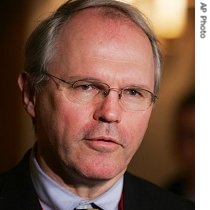2006年VOA标准英语-North Korea Nuclear Talks Go Into Recess With N(在线收听)
By Kurt Achin
Beijing
22 December 2006
Beijing talks aimed at ending North Korea's nuclear weapons capabilities have wrapped up with no tangible progress, but are expected to resume next year. As VOA's Kurt Achin reports from Beijing, the United States and North Korean delegations are trading blame.
 |
| Christopher Hill, 22 Dec 2006 |
He said, "By the end of the week it was clear they would not engage on the actual denuclearization issue."
The United States, China, South Korea, Russia and Japan have tried to persuade North Korea for three years to end its nuclear programs in return for diplomatic and financial benefits.
Despite pledging in September 2005 to start doing that, Pyongyang has taken no concrete steps to fulfill the promise, and conducted its first nuclear weapon test in October.
Chief North Korean negotiator Kim Kye Kwan told reporters Friday the United States is holding the six-party diplomatic process back, by maintaining financial sanctions against his country.
Kim says the sanctions are proof of what the North calls a hostile U.S. policy against it, and says it cannot implement the September agreement substantively under such pressure.
Within days of the September 2005 agreement, the United States Treasury Department warned U.S. banks not to deal with a Macau-based bank it says was helping the North with dollar counterfeiting and money laundering.
The action led the bank to freeze $24 million in North Korean assets, effectively tightening Pyongyang's access to the broader international banking system. North Korea responded by boycotting the six-party talks for more than a year.
North Korean and U.S. finance officials discussed the sanctions on the sidelines of this week's nuclear talks. U.S. envoy Hill calls the financial issue "relatively small," and should not have held up progress on North Korea's denuclearization.
"It was a surprise to us that they refused to engage on the six party issue because of the fact that the financial issues were not yet resolved," he said.
Hill says the talks are now going into recess to give the delegations time to consult with their respective capitals. He says North Korea -- also called the DPRK -- should give its delegates more diplomatic leverage to come to an agreement.
"Negotiators ought to come armed with some instructions to negotiate," he said. "I know the DPRK has a rather unique system, but I think they need to make sure their negotiator has some ability to negotiate."
Hill says he was optimistic that all six delegations reaffirmed their support of the September 2005 joint statement as the basis for moving forward. However, he says the process cannot afford another long North Korean boycott.
"We can't go another 13 months -- it would I think not be possible, we cannot sustain the political support for this process. We do need to make tangible progress... we're talking weeks, not months," he said.
Hill is scheduled to return to Washington Saturday.